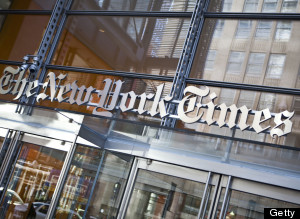The Guardian has decided to partner with the New York Times for some of its reporting on global intelligence and national security, BuzzFeed revealed on Friday.
The paper has been the subject of a very aggressive attack from the British government over its reporting on both American and British intelligence activities. The prime minister, David Cameron, ordered his top civil servant to demand the return of the documents provided to the Guardian by NSA leaker Edward Snowden. When the paper refused, it was forced to destroy several hard drives in the presence of security officials.
British police also detained the partner of Glenn Greenwald, the leading writer working on the Snowden stories, at London's Heathrow airport for nine hours.
In a statement to Buzzfeed's editor, Ben Smith, a spokeswoman for the Guardian said this environment had led the paper to ask the Times to step in.
“In a climate of intense pressure from the UK government, The Guardian decided to bring in a US partner to work on the GCHQ documents provided by Edward Snowden,” the spokeswoman, Jennifer Lindenauer, said. “We are continuing to work in partnership with the NYT and others to report these stories.”
The Times now has some of those documents in its possession, Smith said.
In an article on its website, the Guardian elaborated on its reasons for the partnership, and said Snowden had been informed:
Journalists in America are protected by the first amendment which guarantees free speech and in practice prevents the state seeking pre-publication injunctions or "prior restraint".
It is intended that the collaboration with the New York Times will allow the Guardian to continue exposing mass surveillance by putting the Snowden documents on GCHQ beyond government reach. Snowden is aware of the arrangement.
The Times and the Guardian have worked closely together in the past. Most famously, the two papers collaborated with each other while reporting on documents given to them by WikiLeaks. The Guardian also asked the Times to pursue the story of the phone hacking scandal when it felt it needed another voice in the mix. The Times obliged, giving new life to the then-dormant scandal.
The Times has also been under some internal pressure to increase its reporting on the NSA; recently, the paper's public editor, Margaret Sullivan, said she thought its coverage had lacked "urgency."
Original Article
Source: huffingtonpost.com/
Author: Jack Mirkinson
The paper has been the subject of a very aggressive attack from the British government over its reporting on both American and British intelligence activities. The prime minister, David Cameron, ordered his top civil servant to demand the return of the documents provided to the Guardian by NSA leaker Edward Snowden. When the paper refused, it was forced to destroy several hard drives in the presence of security officials.
British police also detained the partner of Glenn Greenwald, the leading writer working on the Snowden stories, at London's Heathrow airport for nine hours.
In a statement to Buzzfeed's editor, Ben Smith, a spokeswoman for the Guardian said this environment had led the paper to ask the Times to step in.
“In a climate of intense pressure from the UK government, The Guardian decided to bring in a US partner to work on the GCHQ documents provided by Edward Snowden,” the spokeswoman, Jennifer Lindenauer, said. “We are continuing to work in partnership with the NYT and others to report these stories.”
The Times now has some of those documents in its possession, Smith said.
In an article on its website, the Guardian elaborated on its reasons for the partnership, and said Snowden had been informed:
Journalists in America are protected by the first amendment which guarantees free speech and in practice prevents the state seeking pre-publication injunctions or "prior restraint".
It is intended that the collaboration with the New York Times will allow the Guardian to continue exposing mass surveillance by putting the Snowden documents on GCHQ beyond government reach. Snowden is aware of the arrangement.
The Times and the Guardian have worked closely together in the past. Most famously, the two papers collaborated with each other while reporting on documents given to them by WikiLeaks. The Guardian also asked the Times to pursue the story of the phone hacking scandal when it felt it needed another voice in the mix. The Times obliged, giving new life to the then-dormant scandal.
The Times has also been under some internal pressure to increase its reporting on the NSA; recently, the paper's public editor, Margaret Sullivan, said she thought its coverage had lacked "urgency."
Original Article
Source: huffingtonpost.com/
Author: Jack Mirkinson

No comments:
Post a Comment